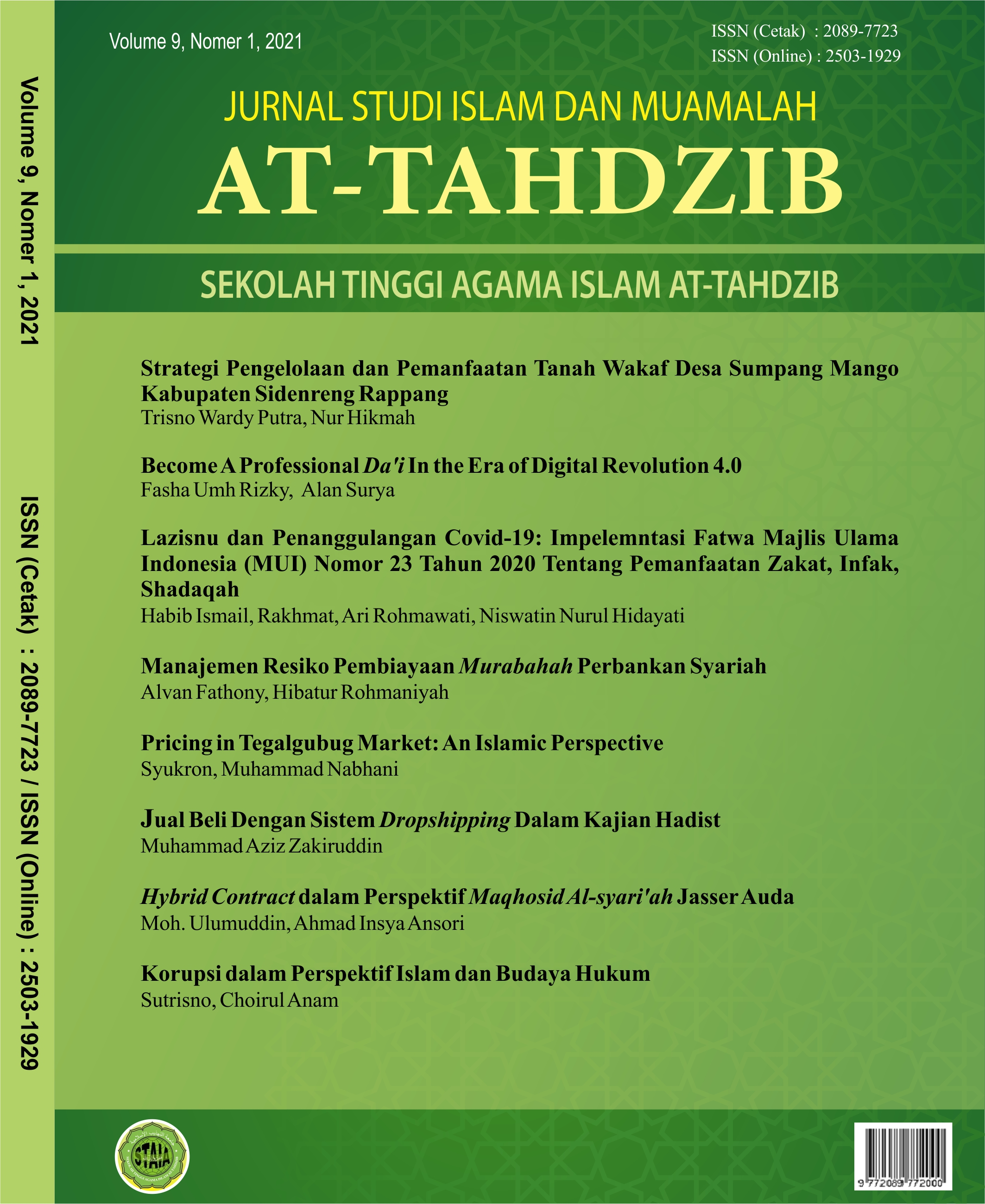Korupsi dalam perspektif Islam dan budaya hukum
Abstrak
Background. The practice of corruption in Indonesia is like an “illegal inheritance†without a will. Law enforcement and its enforcement are constantly evolving and adapting the actions, or types of corruption crimes that exist in society. The majority of corruptors are Muslims. Calculatively, Muslims are bigger than non-Muslims who are involved in corruption.
Aim. This study aims to reflect eclectically on the problem of corruption in Indonesia from the perspective of Islam and legal culture.
Methods. This research is a literature study (library research). Research data comes from books, scientific articles, journals, magazines and other sources relevant to the object of discussion. The research data were analyzed and conclusions were drawn descriptively-analytically.
Results. Islam expressly condemns and curses thieves and looters of other people's property, except for the corrupt. The legal culture shows that corruption is influenced by individual and collective needs and demands, and is also supported by the socio-cultural environment that inherits the tradition of corruption. The government prioritizes the social, economic and political economic status of corruptors. The internal legal culture of law enforcement does not support resolving corruption in court proceedings.
Referensi
Alatas, S. H. (1987). Korupsi, sifat, sebab, dan fungsi. Jakarta: LPIS.
Chambliss, W. J. (1973). Corruption, bureaucracy and power, in Chambliss (ed). Sociologcal reading in the conflict perspective.
Cremer, G. (2008). Corruption and development aid: Confronting the challenges. USA: Lynne Rienner, p.169.
Friedman, L. M. (1975). The legal system: A social science perspective. NY: Russel Sage Fondation.
Heywood, P. (1997). Political corruption: Problems and perspectives. Political Studies, 45(3), 417-435.
Ihsanuddin. (2014). KPK: Anggota DPRD yang terjerat korupsi 3.600 orang. Kompas.Com, 2014, p.1. Retrieved from https://nasional.tempo.co/read/1027618/k pk-indeks-persepsi-korupsi.
Ika, A. (2017). https://ekonomi.kompas.com/read/2017/11/10/054852826/korupsi-di-arab-saudi-tembus-rp-13528-triliun
Kemendikbud. (2011). Buku pendidikan anti korupsi untuk perguruan tinggi/anti korupsi. Jakarta: Cetakan 1.
Klitgaard, R. (2005). Penuntun pemberantasan korupsi dalam pemerintahan. Jakarta: Yayasan Obor Indonesia (edisi ke-3).
Kristiono, N. (2018). Penanaman nilai anti korupsi bagi mahasiswa FIS Unnes melalui mata kuliah pendidikan anti korupsi. Refleksi Edukatika: Jurnal Ilmiah Kependidikan, 9(1), 41-45.
Laoly, Y. H. (1996). Kolusi: Fenomene atau penyakit koronis, dalam Aldentua Siringoringo dan Tumpal Sihite, (Ed). Menyingkap kabut peradilan-peradilan kita – menyoal kolusi di Mahkamah Agung, Jakarta: Pustaka Forum Adil Sejahtera.
Laporan Tahunan KPK 2016.
Moleong, L. J. (2000). Metode penelitian kualitatif. Bandung: Pemuda Rosda Karya.
Mukodi & Haryono, A.B. (2017). Model penyadaran anti korupsi: Redesain konseptual dan aplikatif melalui teenager corruption wacth, (Sugiyono, Ed.). Pacitan: LPPM STKIP PGRI Press.
Mukodi & Haryono, A.B. (2019). Active learning 101 cara pembelajaran anti korupsi di sekolah, (Sugiyono, Ed.) (1st ed.). Pacitan: LPPM STKIP PGRI Press.
Mukodi. (2018). Tela’ah filosofis arti pendidikan dan faktor-faktor pendidikan dalam ilmu pendidikan. Jurnal Penelitian Pendidikan, 10(1), 1426-1438.
Rahardjo, S. (1980). Membedah hukum progresif. Joni Emirzon, dkk (ed). Jakarta: Kompas.
Said, S. (2005). Penegakan hukum anti korupsi. Jurnal Demokrasi, II, 7.
Saputra, A. (2019). Survei penggunaan media sosial di kalangan mahasiswa kota padang menggunakan teori uses and gratifications. Jurnal Dokumentasi dan Informasi, 40(2), 207-216.
Sugiharto, T. (2005). Mengebor sumur tanpa dasar. Jurnal Demokrasi, II, 7.
Syamsudin, M. (2007). Korupsi dalam perspektif budaya hukum. Unisia, 30(64), 183-194.
Umam, A. K. (2014). Islam, korupsi dan good governance di negara-negara Islam. Al-Ahkam, 24(2), 195-224.
Wignjosoebroto, S. (2000). Kompas, 4 September.
Zakiyah, W., dkk. (2002). Menyingkap tabir mafia peradilan. Jakarta: ICW.
##submission.copyrightStatement##
##submission.license.cc.by4.footer##
Jurnal Studi Islam by At-Tahdzib is licensed under a Creative Commons Attribution 4.0 International License.
Based on a work at http://ejournal.kopertais4.or.id/index.php/tahdzib/index





